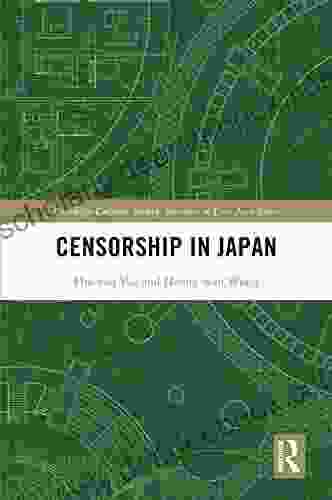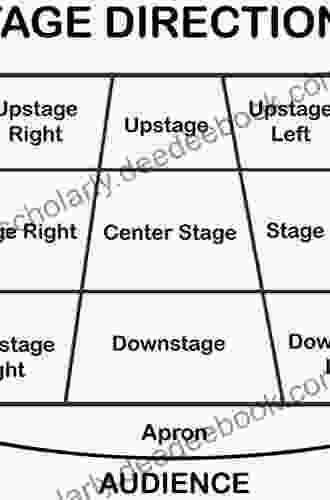Censorship in Japan: Politics, Media, and Culture

Censorship is a complex and controversial issue in Japan. It has a long and checkered history, dating back to the Meiji era (1868-1912). During this time, the government imposed strict controls on the press and other forms of media, in order to suppress dissent and promote national unity. These controls were relaxed somewhat during the Taisho era (1912-1926),but were tightened again in the Showa era (1926-1989),as the government sought to control the flow of information in the lead-up to World War II.
5 out of 5
| Language | : | English |
| File size | : | 4821 KB |
| Text-to-Speech | : | Enabled |
| Screen Reader | : | Supported |
| Enhanced typesetting | : | Enabled |
| Word Wise | : | Enabled |
| Print length | : | 345 pages |
In the aftermath of the war, Japan adopted a new constitution that guaranteed freedom of speech and press. However, the government has continued to exercise some degree of control over the media, through a variety of laws and regulations. These laws include the Public Security Law, which prohibits the dissemination of materials that are deemed to be a threat to national security, and the Broadcast Law, which gives the government the power to regulate the content of television and radio broadcasts.
Censorship in Japan is a complex and evolving issue. It is a topic that has been the subject of much debate and controversy, and it is likely to remain so for many years to come.
Historical Roots of Censorship in Japan
The roots of censorship in Japan can be traced back to the Edo period (1603-1868). During this time, the Tokugawa shogunate imposed strict controls on the media, in order to suppress dissent and maintain social order. These controls included the banning of certain books and plays, and the establishment of a system of censorship for all printed materials.
The Meiji government continued the Tokugawa tradition of censorship, but it also introduced new forms of control. These included the Public Security Law, which was enacted in 1875 and gave the government the power to suppress any publication that was deemed to be a threat to national security. The Meiji government also established a system of press censorship, which was used to control the content of newspapers and magazines.
The Taisho government relaxed the Meiji government's censorship laws, but it did not abolish them. The Public Security Law remained in effect, and the government continued to exercise some degree of control over the media. In the lead-up to World War II, the Showa government tightened censorship controls, in order to suppress dissent and promote national unity.
Legal Frameworks for Censorship in Japan
The legal framework for censorship in Japan is complex and multifaceted. It includes a number of laws and regulations that give the government the power to control the flow of information. These laws include:
- The Public Security Law (1875)
- The Broadcast Law (1950)
- The Film Law (1956)
- The Copyright Law (1970)
- The Child Welfare Law (1974)
The Public Security Law is the most important law governing censorship in Japan. It prohibits the dissemination of materials that are deemed to be a threat to national security. These materials include those that incite violence, promote terrorism, or glorify war. The Broadcast Law gives the government the power to regulate the content of television and radio broadcasts. This includes the power to censor programs that are deemed to be harmful to children or that violate public order.
The Film Law gives the government the power to censor films that are deemed to be harmful to children or that violate public order. The Copyright Law gives the government the power to control the reproduction and distribution of copyrighted works. The Child Welfare Law prohibits the production and distribution of child pornography.
Contemporary Practices of Censorship in Japan
The government of Japan continues to exercise some degree of control over the media, through a variety of laws and regulations. However, the extent to which censorship is practiced in Japan has declined in recent years. This is due in part to the growing influence of international human rights law, and in part to the increasing popularity of the Internet, which has made it more difficult for the government to control the flow of information.
Despite these changes, censorship remains a significant issue in Japan. The government continues to censor materials that it deems to be a threat to national security or that violate public order. The
5 out of 5
| Language | : | English |
| File size | : | 4821 KB |
| Text-to-Speech | : | Enabled |
| Screen Reader | : | Supported |
| Enhanced typesetting | : | Enabled |
| Word Wise | : | Enabled |
| Print length | : | 345 pages |
Do you want to contribute by writing guest posts on this blog?
Please contact us and send us a resume of previous articles that you have written.
 Page
Page Chapter
Chapter Text
Text Story
Story Genre
Genre Reader
Reader Library
Library Paragraph
Paragraph Sentence
Sentence Glossary
Glossary Bibliography
Bibliography Annotation
Annotation Footnote
Footnote Codex
Codex Tome
Tome Library card
Library card Narrative
Narrative Biography
Biography Autobiography
Autobiography Reference
Reference Encyclopedia
Encyclopedia Character
Character Resolution
Resolution Librarian
Librarian Catalog
Catalog Borrowing
Borrowing Periodicals
Periodicals Research
Research Academic
Academic Journals
Journals Reading Room
Reading Room Interlibrary
Interlibrary Study Group
Study Group Thesis
Thesis Dissertation
Dissertation Storytelling
Storytelling Awards
Awards Book Club
Book Club Theory
Theory Textbooks
Textbooks Laurel A Rockefeller
Laurel A Rockefeller Larry Bell
Larry Bell Trisha Ashley
Trisha Ashley Terri Hooley
Terri Hooley Sasha Weber
Sasha Weber Sarah Dzida
Sarah Dzida Larry Ferlazzo
Larry Ferlazzo Suzanne Slade
Suzanne Slade Michael Ferrari
Michael Ferrari Marc Oliver Opresnik
Marc Oliver Opresnik Sean Frazier
Sean Frazier Zoney Chan
Zoney Chan Margaret Coel
Margaret Coel W E B Du Bois
W E B Du Bois Heath B Mcanally
Heath B Mcanally Kacy Burke
Kacy Burke Paul Galdone
Paul Galdone Shannon Brinkley
Shannon Brinkley Hilary Walker
Hilary Walker Des Ekin
Des Ekin
Light bulbAdvertise smarter! Our strategic ad space ensures maximum exposure. Reserve your spot today!

 Camden MitchellResisting the Imposed Place of Belonging: Navigating Multiple Identities and...
Camden MitchellResisting the Imposed Place of Belonging: Navigating Multiple Identities and... Connor MitchellFollow ·18.9k
Connor MitchellFollow ·18.9k Juan RulfoFollow ·10k
Juan RulfoFollow ·10k Gregory WoodsFollow ·11.5k
Gregory WoodsFollow ·11.5k Damon HayesFollow ·12.6k
Damon HayesFollow ·12.6k Jaylen MitchellFollow ·7.1k
Jaylen MitchellFollow ·7.1k Jett PowellFollow ·6.4k
Jett PowellFollow ·6.4k Harvey HughesFollow ·15.5k
Harvey HughesFollow ·15.5k Jared PowellFollow ·6.4k
Jared PowellFollow ·6.4k

 Houston Powell
Houston PowellMusorgsky and His Circle: A Russian Musical Revolution
Modest Mussorgsky was a Russian...
 Barry Bryant
Barry BryantRanking the 80s with Bill Carroll: A Nostalgic Journey...
Prepare to embark on a captivating...

 Kelly Blair
Kelly BlairThe Diplomat's Travel Guide to Festivals, Holidays, and...
India is a land of vibrant culture and...

 José Saramago
José SaramagoFancy Nancy Nancy Clancy: Late-Breaking News!
Nancy Clancy is back with all-new adventures...

 Trevor Bell
Trevor BellGestalt Psychotherapy and Coaching for Relationships: A...
Relationships...

 Federico García Lorca
Federico García LorcaThe Last Love of George Sand: An Enduring Legacy of...
At the twilight of her remarkable life,...
5 out of 5
| Language | : | English |
| File size | : | 4821 KB |
| Text-to-Speech | : | Enabled |
| Screen Reader | : | Supported |
| Enhanced typesetting | : | Enabled |
| Word Wise | : | Enabled |
| Print length | : | 345 pages |










